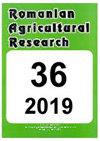Spatial Simulation of Rice Grain Yields by Empirical Models
IF 1
4区 农林科学
Q3 AGRONOMY
引用次数: 0
Abstract
Rice grain yields can be affected by several parameters including mostly the climate, cultivars, soil types, and the fertilizer managements. In this study, the performance of two empirical models i.e. AquaCrop and artificial neural network models for simulating the grain yields of two most cultivated varieties including the Shirudi (high-yielding) and Tarom (low-yielding) in three contrasting soil series with different fertilizer managements, were calibrated and validated during 2016 and 2017 rice growing seasons for 459 paddy fields in Mazandaran province, northern Iran. Both models were tested by correlation (R2 ), normalized root mean square error (nRMSE) and coefficient of residual mass (CRM). Results indicate that the performance of both models were affected by the rice cultivar, soil type and soil fertilizer management for both calibration and validation datasets. The ability of both models proved to be satisfactorily applicable for spatial simulation of rice yields in northern Iran, but AquaCrop model was superior. The higher accuracy was observed in AquaCrop for the Shirudi cultivar (R2 =0.89; nRMSE=5.87%; CRM=0.03) compared to the Tarom (R2 =0.67; nRMSE=10.41% and CRM=0.04) for 2017 dataset demonstrating that the AquaCrop has more performance for high-yielding cultivar. Two models had lower accuracy in Esmaeilkola soil series with deep clay soil texture. The best accuracy was observed in paddy fields with optimum fertilizer managements for both models. Overall, it is possible to suggest that AquaCrop model could be used to simulate the spatial distribution of rice grain yield with an acceptable accuracy at province-scale and is applicable for local climate change related scenarios.基于经验模型的水稻产量空间模拟
水稻产量主要受气候、品种、土壤类型和肥料管理等因素的影响。本研究在伊朗北部Mazandaran省459块稻田的2016年和2017年水稻生长季,对AquaCrop和人工神经网络两种经验模型(即AquaCrop和人工神经网络模型)的性能进行了校准和验证,以模拟三个不同肥料管理的对比土壤系列中两个最常见的品种(Shirudi(高产)和Tarom(低产))的粮食产量。采用相关系数(R2)、归一化均方根误差(nRMSE)和剩余质量系数(CRM)对两个模型进行检验。结果表明,在校正和验证数据集上,两种模型的性能均受到水稻品种、土壤类型和土壤肥料管理的影响。两种模型均能较好地应用于伊朗北部水稻产量的空间模拟,但AquaCrop模型更优。在AquaCrop中,四如地品种的准确度较高(R2 =0.89;nRMSE = 5.87%;CRM=0.03)与Tarom相比(R2 =0.67;nRMSE=10.41%, CRM=0.04)表明AquaCrop在高产品种上具有更好的性能。两种模型在深粘土质地的埃斯迈伊尔克拉土壤序列中精度较低。在最优施肥条件下,两种模型的精度最高。综上所述,AquaCrop模型可以在省尺度上以可接受的精度模拟水稻产量的空间分布,并适用于局地气候变化相关情景。
本文章由计算机程序翻译,如有差异,请以英文原文为准。
求助全文
约1分钟内获得全文
求助全文
来源期刊

Romanian Agricultural Research
农林科学-农艺学
CiteScore
0.90
自引率
28.60%
发文量
2
审稿时长
>12 weeks
期刊介绍:
The Journal ROMANIAN AGRICULTURAL RESEARCH is an “open access” one, which publishes original articles, short communications, presenting new scientific results – theoretical, experimental and technical – on plant breeding and genetics, physiology, biotechnology, mineral nutrition and plant protection, in field crops. Reviews on up-to date subjects and recent research, preferably from Eastern Europe, may also be published.
 求助内容:
求助内容: 应助结果提醒方式:
应助结果提醒方式:


